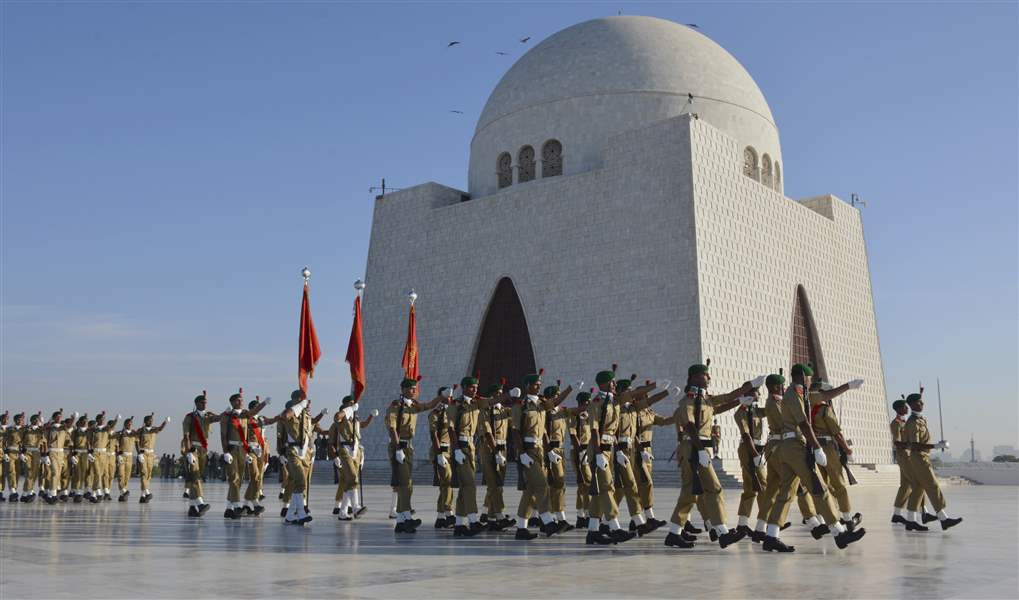
Special memories, stark divides highlight city of Karachi
12/31/2017

A contingent of the cadets of Pakistan army march during a change of the guard ceremony to mark the 141st anniversary of the birth of Mohammed Ali Jinnah, founder of Pakistan, at the Jinnah mausoleum in Karachi, Pakistan, on Dec. 25, 2017.
ASSOCIATED PRESS
KARACHI, Pakistan — A lecture invitation brought me to this teeming metropolis of 15 million people located in the south of the country on the Arabian Sea. It is always delightful to visit Karachi because of its fine restaurants, art galleries, universities, old magnificent buildings, and some wonderful people.
At the time of independence in 1947 Karachi was a moderate size city where non-Muslims were the majority. In the past 70 years, however, the demographics have changed. Now small numbers of Parsees, Christians, Hindus, and perhaps some Jews remain. The rise of xenophobic sectarianism has caused the minorities to feel besieged and trapped. The government does everything possible to protect them, but occasionally the militants and the terrorists succeed in targeting the minorities, including Muslim minorities.
Karachi has many contradictions. Amidst poverty there is opulence. A few miles from slums are the magnificent mansions of the rich. Beautiful roads exist side by side with rutted roads. Religious schools that teach mostly an orthodox and xenophobic Islam exist along with some of the elite schools in the city. Poor people rely on the religious schools, and the children of the well-heeled attend the likes of the prestigious Grammar School.
Then there is the ethnic divide. A large number of Muhajars — or refugees — dominate Karachi. Their parents and grandparents had migrated from India to Pakistan at the time of independence. In other parts of Pakistan these refugees have integrated into the community, yet the Muhajars in Karachi stubbornly hold onto their ethnic identity and do not mingle as much with the local Sindhi population. Add to the equation a large number of Pashtuns who had come for work and economic opportunities from the north plus an equally large number of Punjabis from the dominant province of Punjab, and the combination has become a combustible one. Each community tries for dominance that occasionally explodes in ethnic violence. Today the Muhajars are the most dominant, and their political party Mutahida Qoami Mahaz rules the city.
Afzal Zaidi is one of the four deputy commissioners of Karachi who is responsible for law and order in his jurisdiction. He puts in long hours, but with so many factions vying for dominance he cannot pay adequate attention to the fine details of governance. Over dinner one night he talked about Karachi and its myriad problems, including ethnic divides, violence, and relative lack of civic amenities. Still, the young and energetic civil servant remains refreshingly upbeat and optimistic.
My invitation to lecture in Karachi had come from a unique institution established by an equally unique woman. In 2006, Sameen Mahmud, an artist and human rights activist, created a safe space where artists, musicians, historians, and dissidents could hold intellectual conversations and performances. In no time the place called the T2F — The 2nd Floor — became a magnet for these people. It was when she invited a dissident group from the province of Baluchistan in 2015 that she was gunned down, presumably in retaliation. She was barely 40 at the time. It was a sort of pilgrimage for me to visit the secular shrine that Sameen had created. Her indomitable spirit still permeates the place.
In Karachi I had the opportunity to meet some extremely interesting people. Qavi Khan is a well-known big screen and television star. Back in the early 1950s when we were school boys in Peshawar we used to walk a mile from our homes to to Radio Pakistan to participate in a children’s program. Later in college I wrote radio plays, and Qavi played the central roles in them. After that we went our separate ways and lost contact. It was refreshing to meet him after 60-odd years and reminisce about the past as well as talk about the present.
For me no visit to Karachi is complete without visiting my dear friend Zia Mohyeddin, a veteran of London Theater as well as Broadway and Hollywood movies. At 90, he is still sprite, intellectually sharp, and full of wit and wisdom. He is doing a one-man show on Shakespeare where he has woven together pieces from seven plays into a riveting narrative. I spent an evening with him and a few of his literary friends at his home. When he brings his show to the United States next summer, he has promised to come to Toledo. He is not a stranger to our city as he has performed twice in private settings.
S. Amjad Hussain is an emeritus professor of surgery and humanities at the University of Toledo. His column appears every other week in The Blade. Contact him at: aghaji@bex.net.